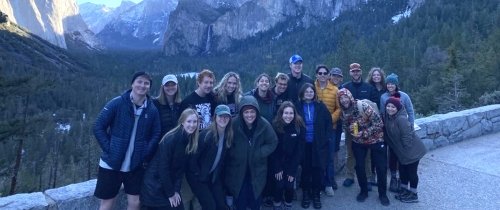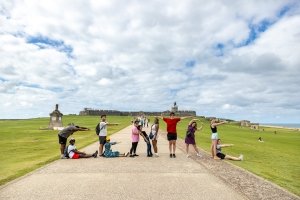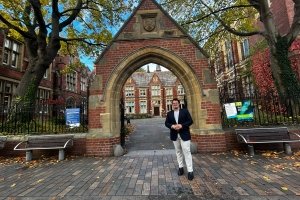
New Centre-in-Tahoe program gives students an outdoor academic experience
Centre College’s new Centre-in-Tahoe program launched during CentreTerm 2022, providing an outdoor academic experience that covers the topics of adventure, inclusivity, sustainability, risk and wellness.
During the course, Brett Werner, associate professor of environmental studies, wanted his students to learn why outdoor spaces matter to economies, communities and individuals’ physical and mental health. In addition, the course explored the access and inclusivity in outdoor experiences; risk, safety and the challenge of pushing one’s limits; sustainability and what it means to leave no trace. All students participated in wilderness first aid training and passed the certification test.
“I hope that the kinds of lessons learned in the outdoors—about leadership, cooperation, support and overcoming challenges—can be translated back to their lives at Centre and beyond,” Werner said.
While in the Lake Tahoe area, students went snowshoeing multiple times, and on one trek, they camped for two nights in the middle of the Sierras, where they experienced zero-degree temperatures overnight, tents pitched on top of six to 10 feet of snow, melting snow for water, carrying food and packing waste in backpacks and on sleds.
The group also had the opportunity to visit the California coast to try surfing and mountain biking. Additionally, students enjoyed skiing, rock climbing, hiking, trail running and kayaking.
For their final projects, students created entrepreneurial plans for new businesses and non-profits, related to the outdoors, trying to figure out how to make activities more economically accessible and culturally inclusive. Others developed proposals to incorporate outdoor wellness more at Centre, and some did an academic analysis of the relationship of indigenous people, lands and outdoor activities. Additionally, a number of students creatively investigated the literature of the outdoors.
From an academic perspective, Werner points to three inspirations for the course: prior teaching experiences, a desire to build and develop outdoor programs at Centre and his students.
“First, as an environmental studies professor, I have been thinking about ways to get students to think and care about nature and the outdoors for years, teaching such courses as ‘In Search of Nature and Saving Wild Places,’” he added. “Second, I have been working with a coalition of students, staff and faculty to build up outdoor programming at Centre for the incredible benefits it can have for physical and mental wellness, infusion with class experiences like being able to access harder to reach places for field work, and the life skills associated with leisure enjoyment of the outdoors.
Over the last several years, Werner has also had students work on some of these topics as part of their senior seminar projects, which helped him think more about the big course topics like sustainability, inclusivity, adventure and risk in the outdoors.
One of Werner’s goals for the course was to get students who have never done much in the outdoors to become more comfortable and accomplished doing outdoor activities and recognize the amazing benefits for their well-being from spending more time outside. He also wanted to help the more experienced students to understand the complexities of the things they might take for granted: where their outdoor gear comes from, who supports their experiences, why they have sought out these experiences and the other complexities that don’t always figure strongly in “Outside” or “Backpacker” magazines.
Through this experience, Werner said he hopes students come away feeling more empowered, knowing that they can handle the difficult challenges that time spent outdoors can give them and realize the complexities and challenges posed by the tradition and legacy of the outdoors.
This course will continue as a semester-long, collaborative program called the Tahoe Semester for students in the Association of Presbyterian Colleges and Universities.



